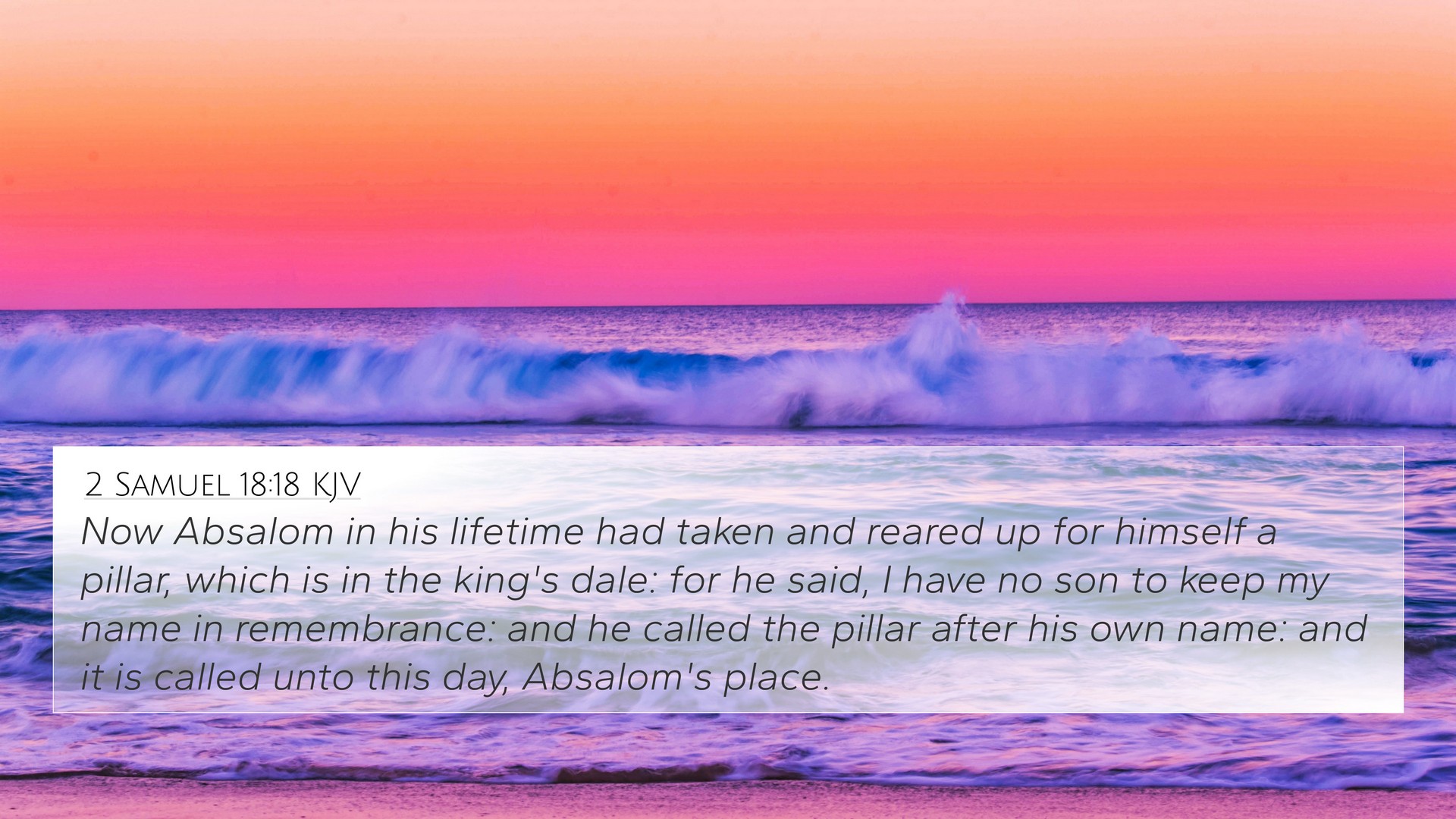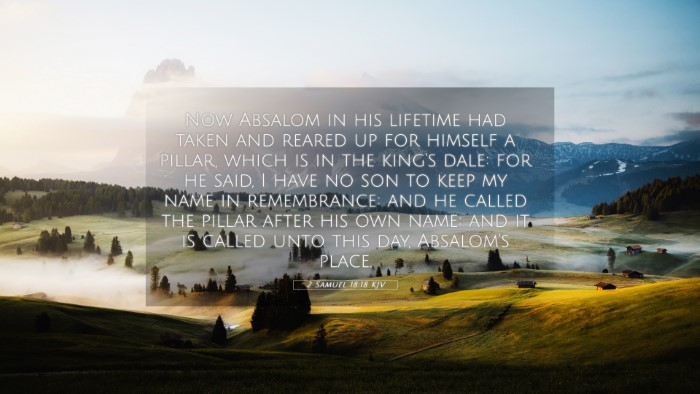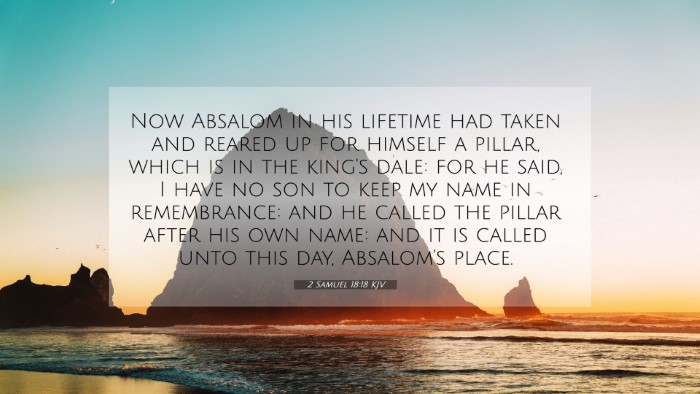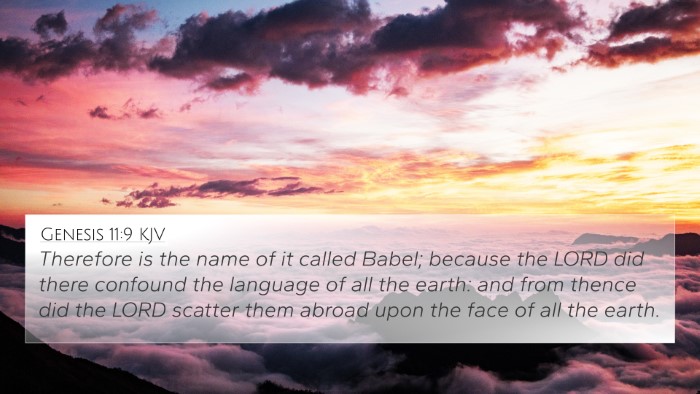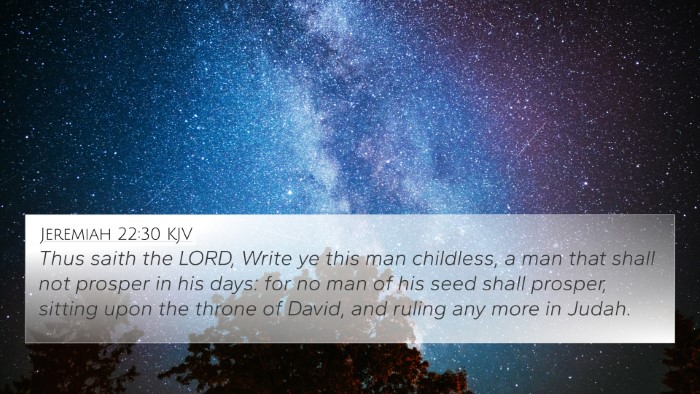Understanding 2 Samuel 18:18
The verse 2 Samuel 18:18 states: "Now Absalom in his lifetime had taken and set up for himself a pillar which is in the King's Valley, for he said, 'I have no son to keep my name in remembrance.' And he named the pillar after his own name, and it is called Absalom's Monument to this day."
Overview
This verse reveals Absalom's desire for legacy and remembrance in a culture where sons were essential for keeping a family's name alive. To understand this verse deeply, we will explore its implications on Absalom's character and his relationship with David, his father, as well as its connections to other significant themes in the Bible.
Insights from Public Domain Commentaries
-
Matthew Henry:
Henry emphasizes the vanity in Absalom’s act of creating a monument for himself. Rather than seeking a godly legacy through faith and righteousness, Absalom resorted to prideful means to be remembered. This episode speaks to the transient nature of human achievements and the ultimate futility of seeking glory apart from God.
-
Albert Barnes:
Barnes points out Absalom's lack of a son as a key element of his legacy concern. In times of monarchy, lineage was crucial. His choice of a pillar instead of a son illustrates a deep-seated insecurity. Furthermore, this moment foreshadows the calamity that would follow in his life due to his rebellion against David.
-
Adam Clarke:
Clarke notes the significance of the King’s Valley, which symbolizes both sorrow and judgment. Absalom's monument stands as a reminder of his rebellion and the consequences that ensued. Clarke highlights that earthly monuments cannot replace the importance of a legacy built on godliness and spiritual heritage.
Thematic Connections
This verse invites reflection on themes such as the desire for legacy, human vanity, and the pursuit of remembrance. Absalom's action is starkly contrasted with biblical ideals surrounding legacy, particularly how it intertwines with divine approval and guidance.
Key Themes: Legacy and Remembrance
- Legacy in the Bible: The concept of legacy is prominent throughout Scripture, such as in Proverbs 13:22 and Psalm 112:6, emphasizing a righteous legacy over self-glorification.
- Human Vanity: Ecclesiastes 1:2 discusses the vanity of human endeavors, connecting to Absalom's misguided efforts to secure his memory.
- Remembrance of God: Exodus 3:15 emphasizes the importance of God’s name and remembrance, contrasting with Absalom's pursuit of his notoriety.
Cross-References for 2 Samuel 18:18
Several verses resonate thematically with 2 Samuel 18:18, further elucidating its meaning and implications. These cross references help deepen the understanding of Absalom's actions:
- 2 Samuel 14:27: This verse discusses the children of Absalom, further expanding on his desire for legacy.
- Psalms 49:11: “Their inward thought is that their houses will last forever…” This verse speaks to the human tendency to seek permanence through earthly constructs.
- Proverbs 10:7: “The memory of the just is blessed...” highlighting the disparity between godly remembrance and self-promotion.
- Luke 12:16-21: The parable of the rich fool also illustrates the folly of building monuments in the absence of a relationship with God.
- Isaiah 53:3: Reflects the aspect of rejection and how true significance is often overlooked in favor of self-assertion, similar to Absalom's life.
- 1 Chronicles 3:1-3: Chronicles the descendants of David, providing the context of rightful legacy compared to Absalom's self-made monument.
- Matthew 6:19-21: This passage advises against storing treasures on earth, which resonates with Absalom's focus on earthly legacy.
Conclusion
2 Samuel 18:18 serves as a multifaceted reminder of the human condition regarding legacy, memory, and the pursuit of glory. Through Absalom’s tragic narrative, we find caution against vanity and a call to seek a legacy that intertwines with divine purpose rather than one that seeks to glorify oneself. Analyzing this verse in conjunction with other biblical texts provides a comprehensive understanding of how legacy, humility, and remembrance are woven throughout Scripture.
